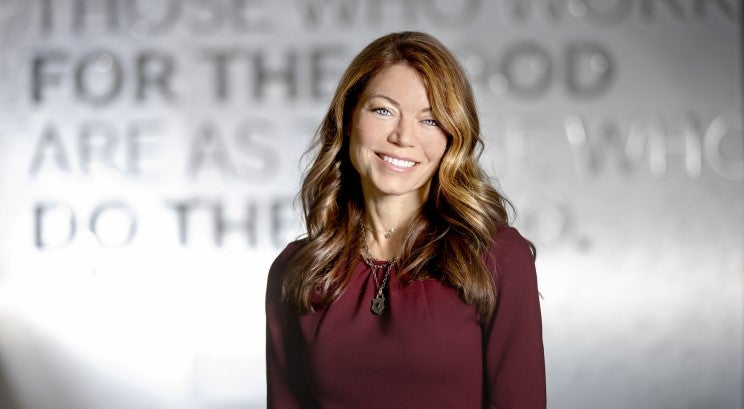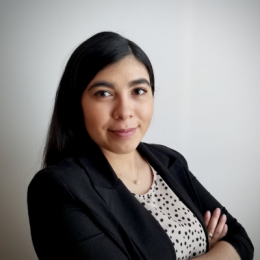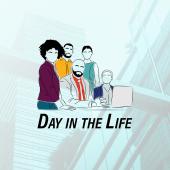Volume 37 , Number 3 , Page 80-83

Sara L. Hall is the chief legal officer and general counsel at American Lebanese Syrian Associated Charities (ALSAC) — the fundraising and awareness organization for St. Jude Children’s Research Hospital. St. Jude focuses on treating catastrophic diseases, especially leukemia and other cancers that affect children.
ALSAC raises 75 percent of St. Jude’s operational funds, the majority of which come from generous donors all over the United States, and ensures that no family ever receives a bill from St. Jude. As the nonprofit’s chief legal officer, Hall knows that standing tall and ensuring the utmost legal compliance at ALSAC is crucial to maintaining the integrity of St. Jude’s brand and mission.
Hall’s roots in Tennessee are deep. Before joining St. Jude in Memphis, Hall grew up in rural east Tennessee on a large farm. Her father was an accountant turned farmer; her mother was a calculus professor. Growing up in the country gave her a healthy respect for hard work and a love for the outdoors.
But she knew early on that she wanted something different for her life. Her spark of inspiration: The Perry Mason show, which followed a defense lawyer who zealously defended his clients, did what he thought was right, and never seemed to lose a case. She admits it’s an unusual thing to inspire her: “I always thought my job was to stand up and defend the right thing and solve the difficult problems when no one else was.”
Additionally, she noted the lawyer’s thought processes: Perry Mason, played by Raymond Burr, demonstrated how a lawyer thought “strategically and analytically.” So, from the time she was six years old, Hall knew that lawyers were people who advocated for the right things — and that was what she wanted to do.
But while Perry Mason reruns may have provided the visual spur, her mother’s values are what instilled an early understanding of what to do in the face of injustice. “My mom was a missionary’s daughter, and one of the most important values she taught us, my brother and me (he’s a doctor), was that you should stand up when everyone else is sitting down, particularly on matters of significance.”
ALSAC’s beginnings: From a prayer for success
American Lebanese Syrian Associated Charities (ALSAC) is among the largest healthcare related charities in the United States. The sole purpose of ALSAC is to raise funds and awareness to support St. Jude Children's Research Hospital.
The charity was founded by actor and singer Danny Thomas in 1957. As the St. Jude website tells the story: Thomas was struggling to launch his entertainment career and went to a Detroit church to pray for success, especially as his wife was expecting their first baby. Moved by the sermon, he gave his last few dollars to the church. He prayed for help to pay the hospital bills. The next day, he landed a role that paid many times what he’d given. As Thomas continued to struggle, he prayed to St. Jude Thaddeus, the patron saint of hopeless causes. Thomas asked the saint to “help me find my way in life, and I will build you a shrine.” His career took off.
Danny Thomas’s shrine to St. Jude became a hospital for children with cancer. To raise money for the hospital and its maintenance, Thomas, of Lebanese descent, turned to his fellow Arab Americans. In 1957, 100 representatives of the Arab American community met in Chicago to form ALSAC with a sole purpose of raising funds for the support of St. Jude Children’s Research Hospital. The mission continues today.
At age 33, Hall became the youngest city attorney for Memphis, a joint mayor-city council appointee, for what was the 17th largest city in the country. There, she oversaw nine departments and a large staff, including a number of attorneys who had children older than she was. Her youth and background made her a wildcard.
People weren’t sure what to make of her, and Hall used that to her advantage. “It really gave me the opportunity to be bold and courageous in my decisions,” she remembers. Hall was able to make her own way and decided early on that she would use her position to take a stand — even if those stances were at times controversial.
Hall recalls that shortly after she had been named city attorney there was an interim period where the former city attorney had departed, but Hall had not been formally sworn into her new position but was instead still formally serving in her former role as city human resources director, also the youngest appointee to ever hold that role.
During this time, there was a controversial issue involving interpretations of the city charter upon which the mayor and the city council disagreed. The mayor confided in Hall as legal counsel, and she provided advice. When Hall was asked during the city council meeting to provide that information in an open public session, she declined, citing attorney-client privilege.
“They advised me that they were waiving the attorney-client privilege, and I advised them that the privilege inures to the benefit of the organization and cannot be waived unilaterally by a body of the whole. I advised that I was declining to waive the privilege because I did not believe it was in the city’s interest to do so in an open public session,” she recalls.
After some back-and-forth with the city council, they ultimately threatened to vote to remove Hall as city attorney unless she disclosed the information. She did not disclose it. After the meeting concluded, Hall walked up to every city council member and told them that she respected them in their role, but that as city attorney, it was her responsibility to serve the city as a whole — which included the mayor and the city council. Regardless of the outcome, she was going to work to be their attorney and to give them the best advice that she could, as long as she could, and as long as she was in office.
Hall went home that night and did not know if she would have a job the next day. Ultimately, the city council did not vote her out of office. The experience taught her the importance of having unwavering resolve, but doing so in a way that is respectful to the other side.
Hall muses, “I think there’s probably nothing that tests ethics, the law, and the attorney-client privilege and relationships more than working for a governmental entity where you represent both the administration and the legislative body and you’re trying to work through controversial issues.”
But overall, she maintains that it was a great learning experience that helped her develop who she is now as a chief legal officer. “Being almost fired for doing the right thing gave me confidence and a wonderful freedom to be able to get up every day and say, ‘I’m going to make things happen and do the right thing. If I fall, I fall. But I’m sure going to try.’”
After over 10 years as an appointee in government, and nearly four years as city attorney, Hall served as vice president, general counsel, and secretary at Memphis & Shelby County Airport Authority for a little under four years. In 2010, she landed her current position at ALSAC. In many ways, Hall finds working in-house as a CLO to be similar to litigation because “you don’t know what’s going to happen next, but you’re in the middle of it, and you’re working through it.”
One of the major appeals of being in-house or a CLO is that you can be a strategist, business partner, truth-teller, devil’s advocate, and lawyer every day who makes the right thing happen for the organization.
“Being in-house, you understand the organization,” she states. “You know the people. If you handle issues as a strategic business partner and develop a reputation for making things happen within your company, you are more likely to have a seat at the table and be in the room for the decisions, the debates, and the discussions. You’re able to craft a better path rather than just running onto the path to remove the boulders or to direct them in a different way halfway down the path.”
On her legal team, it’s important to Hall that everyone knows how to navigate complex issues with a solution that is not only legal, strategic, and practical but also socially and morally responsible. She emphasizes that brand and reputation are especially critical for nonprofits who, unlike for-profit entities, do not sell a good.
“When a donor gives money, they are giving to the mission. They are giving with the belief that the nonprofit will take those funds and use them to grow and support the mission.” As such, Hall stresses that nonprofits need to be ever vigilant of how their brand is perceived in the marketplace and watch for inappropriate logo use and association. As chief legal officer and general counsel, much of this responsibility falls to her and the legal department.
Keeping the public’s trust: Data protection
Protecting the organization’s brand is only one aspect of cultivating trust with the donors — another major part is data protection. With recent advents such as the General Data Protection Regulation and the looming California Consumer Privacy Act, and other US state and federal legislation potentially on the horizon, Hall and her team are closely watching regulations that are meant to safeguard donor data, privacy, and information. “We continue to look to the future and what may be, and work to be prepared but nimble.”
In addition to privacy, the ALSAC legal department handles issues related to fundraising, marketing, financial transactions, intellectual property, social media, trusts, estates, technology, and complex gifts. With 30 offices across the country, the department also pays close attention to adherence to state regulations regarding Charitable Gift Annuities, Commercial-Co-Ventures, DREAM HOME™ raffles, employment, and real estate.
By taking a strong compliance stance on all aspects of ALSAC’s work, Hall is furthering the trustworthiness of St. Jude’s brand and mission — one she whole-heartedly supports. As St. Jude Children’s Research Hospital works to find cures for children with cancer, Hall and her team are “always innovating, testing, and iterating to ensure that [they] can continue to further the mission of St. Jude Children’s Research Hospital and really raise the funds and awareness needed to fight.”
Getting to know ... Sara L. Hall
How do you deal with stress?
“I’m a distance runner turned yogi for the past 25 years. I started doing yoga selfishly to teach myself how to lower my heart rate quickly in court or in my office when I had an adrenaline response to a crisis, which was helpful in the moment but over the course of one’s life is not a healthy way to live. So, I have received a tremendous amount of joy, and peace, and probably sanity out of my yoga practice. Just the ability to observe and control my thoughts helps me appreciate all that I have and deal with the stress of the day in a way that’s positive.”
What’s something people are always surprised to find out about you?
My headliner answer would be “I’m a non-conformist at the core. I am not on social media and I have never tasted coffee, and yet I have a full life.” The more layered and honest answer would be that like many driven, successful people, I am still learning how to integrate who I am and what motivates me at work and at play.
At work, I am an analytical, fearless (but not reckless) risk-taker and truth-teller who makes things happen. At play, I am a nature loving, long distance runner turned yogi that tries to celebrate simple pleasures and moments of joy who will be adding and checking off adventures on my list of “must do’s” forever. I believe we all have the power to do anything we set our minds to — even the things that scare us the most.
I have been so fortunate to have been able to do that and work first as public servant and now at ALSAC/St. Jude, a place of hope making a tremendous difference in the lives of children and their families where our mission is: Finding Cures. Saving Children. So, past the no coffee and social media answer, it’s the honesty in acknowledging that seeking a life as well as a living is an ongoing practice and certainly a work in progress every day.
As a lifelong Tennessee resident, which has better music, Nashville or Memphis?
Memphis. Memphis has grit and soul and originality. Being a river town, Memphis attracts people from very different backgrounds. This is special, particularly for the South. I think that — coupled with St. Jude Children’s Research Hospital, which brings researchers, doctors, and people from around the world here — it instills in Memphians the spirit of the good Samaritan: the desire to help your neighbor. And Memphis is one of the most fun, original, authentic cities that I could ever imagine.




